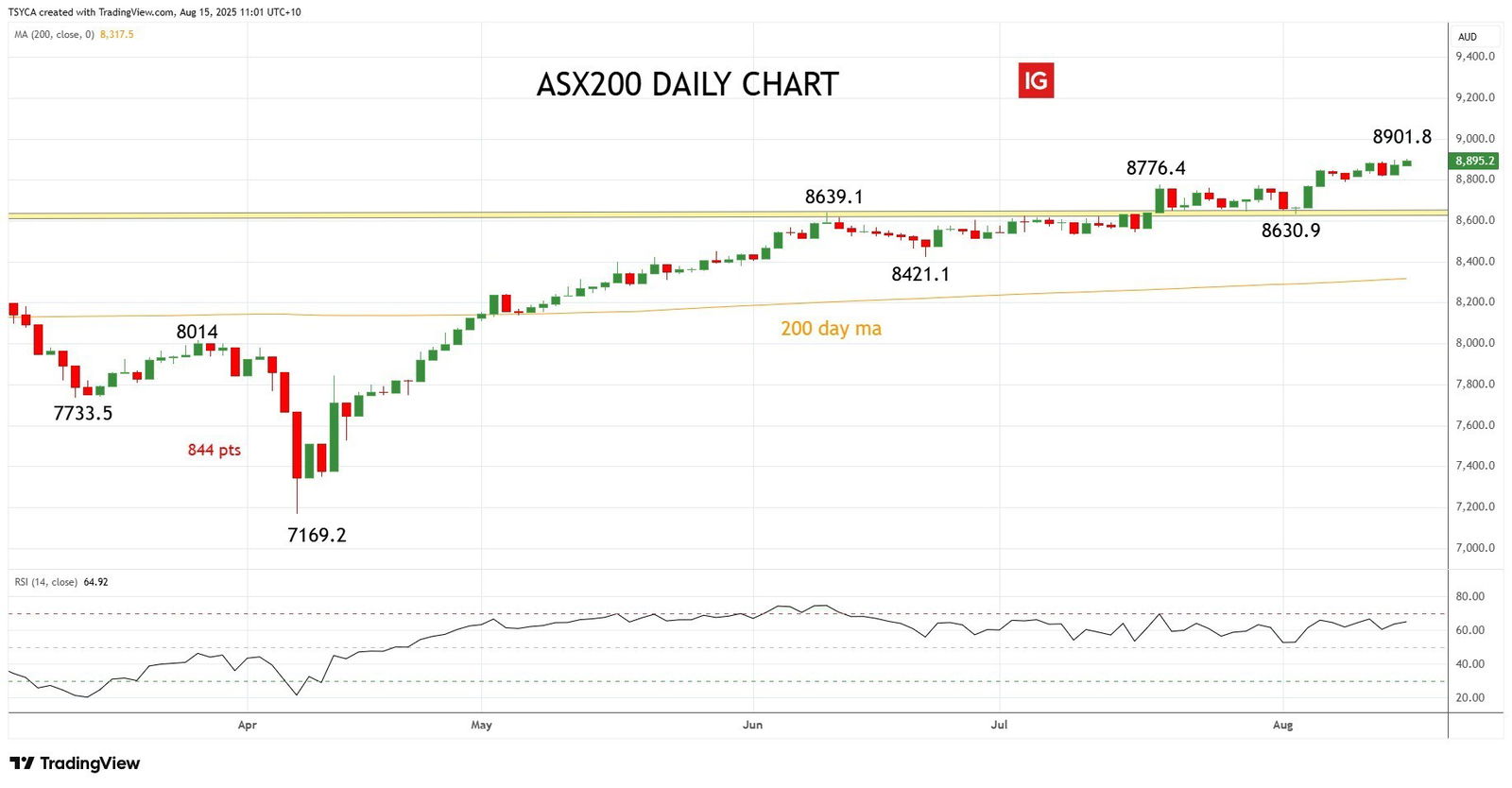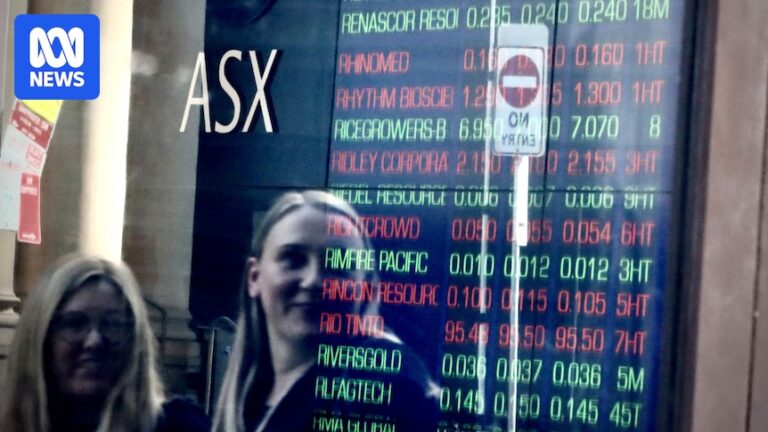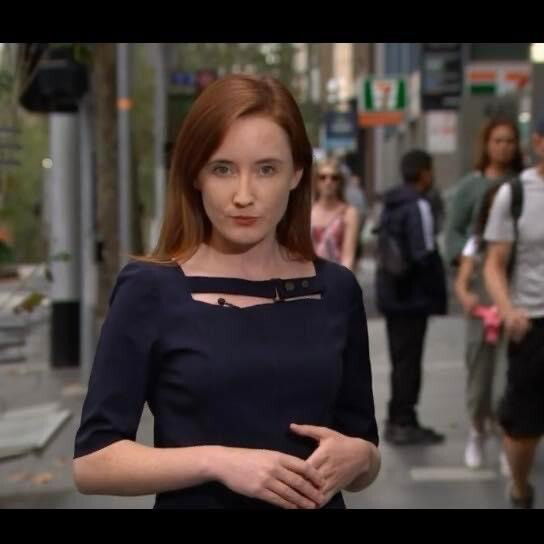Market snapshot
Price current around 11:00am AEST
Live updates on the major ASX indices:
Final verdict for Qantas outsourcing case penalty due on Monday
ASX soars following latest Chinese economic data
The Australian share market hit another all-time high just after midday.
The S&P/ASX 200 hit 8,904 index points.
It appears to be off the back of the latest official Chinese economic data.
Retail sales last month rose 3.7% from a year earlier, according to the National Bureau of Statistics.
Estimates for a 4.6% growth in a Reuters poll.
Industrial output rose 5.7% from a year ago in July, its weakest level since November last year, and weaker than analysts’ expectations for a 5.9% rise.
This may be a case of bad economic news being good news for markets — that is, the worse the news, the more likely it’ll be followed by jumbo-sized government stimulus measures.
Mirvac says rate cuts will boost housing activity
Property developer Mirvac expects a pick-up in the housing market will boost profit this year.
The company announced a $68 million profit, while revenue fell 10 per cent to $2.74 billion in the year ending June.
The result was a big turnaround in profit from the $805 million loss recorded in the previous year.
The developer says going forward the housing market will be strong with further rate cuts.
“Market conditions are expected to improve across all sectors over the next financial year, supported by lower inflation and a further easing of interest rates,” Mirvac chief executive Campbell Hanan said.
“We have multiple levers for future growth, supported by more favourable market conditions, as well as our unique development capability and ability to attract high-quality third-party capital to our business.
“We expect a return to growth in FY26, and subject to no material change in the operating environment.”
The company’s stock was trading 1.5 per cent lower at $2.28 on Friday at 12:09 pm AEST.
Rugby boosts spending in July, but trends also look stronger: CBA
The Commonwealth Bank uses its mountain of customer transaction data to put together a monthly House Spending Insights (HSI) report.
The index rose 0.8% in July, following an upwardly revised 0.5% increase in June.
CBA economists Belinda Allen and Lucinda Jerogin say the British and Irish Lions rugby union tour, which brought a lot of overseas visitors to the country, as well as State of Origin rugby league contributed.
“In July, 10 spending categories recorded positive growth, one was flat and one recorded a fall,” they note.
“Leading the gains this month was Recreation (+1.8%) and Hospitality (+1.5%). Spending on travel bookings, accommodation and eating & drinking out lifted over the month.”
However, the HSI is also up 6.4% over the past year, with communications and digital (+10.9%), recreation (+10.3%) and hospitality (+10%) leading the way.
“We noted in the June release that there has been signs of more consistent spending growth the last five months. This trend continued in July, reinforcing our view that there are signs of life in consumer spending,” CBA’s economists note.
“A pick up in real household disposable income, household wealth and a still solid labour market all suggest consumer spending should be lifting.
“The response though has been slower than expected as households have focused on saving and paying down debt rather than lifting spending in a consistent fashion. We continue to expect a pick‑up in spending over the rest of 2025 and into 2026, driving an economic recovery.”
And that probably means fewer rate cuts than many borrowers are hoping for.
1h agoFri 15 Aug 2025 at 2:10am
The complicated issue of cochlear implants
Perhaps not relevant to this blog, but as the mother of a Deaf child, can we please have a conversation around cochlear implants? Amplifying natural sound is always a better solution, and we are fortunate enough that my child does not need cochlear implants. But the number of times I have to explain this to people! Cochlear implants remove all existing hearing and replace it with something that sounds quite robotic, and not at all natural (the movie Sound of Metal explores this beautifully.) They are not a “miracle cure.” They don’t “restore” hearing. And just as my child has to struggle with their hearing aids to differentiate the sounds that are important from the sounds that aren’t, so, too, do people who use cochlear implants – it’s a lot of brain work. I am grateful this technology exists for the people who choose to utilise it. But they are over-hyped, and as the parent of a deaf child, I am sick of people assuming they are a “cure.” My child is perfect just as they are. They don’t need to be “cured.”
– complicated issue
Thanks for reading and for your comment — reading your last line, all I can think is how lucky your child is to have you as their loving parent.
Cochlear implants aren’t something I know much about so thanks for sharing your experience — it brings to mind this important piece from our ABC colleagues Evan Young and Nas Campanella last week.
It explores the social model of disability, which posits that people with disability are disabled, not by their impairments, but by the world around them:
1h agoFri 15 Aug 2025 at 1:48am
Bitcoin fall suggests reduced ‘risk appetite’
Hi,
DT jumping into the blog.
Risk assets, like shares, have been consistently breaking records over the past few weeks.
Last night saw a bit of a pull-back on Wall Street.
The price of Bitcoin fell as a result.
What does that tell us about how Bitcoin is viewed as an asset?
Here’s IG’s Tony Sycamore’s thoughts:
“Bitcoin is trading lower at $118,259 (-4.15%) following its record-breaking surge to $124,517 yesterday after it collided with the pivotal $125,000 monthly trend line resistance, viewed on the chart below.
“The pullback was intensified by a scorching US PPI inflation report, which dampened expectations for aggressive Federal Reserve rate cuts into year-end impacting risk appetite across crypto markets.
“Notably, yesterday’s peak of $124,517 marked exactly one month since Bitcoin’s prior record high of $123,236 on July 14.”
That all leads to this interesting line from Mr Sycamore:
“Bitcoin and Ethereum are viewed as risk assets at the very pointy end of the risk spectrum.
“If they were to extend their pullback it would be a warning sign for other risk assets, particularly US equities.”
Cochlear ‘weak result’ falls short of market expectations
Cochlear reported a weak result with net profit coming in at $392 million, up 1 per cent (4 per cent decrease in constant currency), and below market consensus.
According to RBC Capital Markets managing director James Strong, while the result is within management’s revised FY25 NPAT guidance range of $390 million to $400 million, it came in at the low end.
He said acoustics revenue growth was below expectations, cash conversion was weak due to a build of working capital associated with the launch of new products, and the mid-point of the FY26 NPAT guidance range is below consensus forecasts.
“We expect the stock to underperform the market today,” he said, giving the stock a negative rating and price target of $294.
The share price was trading almost 2 per cent lower at $300.15 at 11.18am AEST.
But the good news is that Cochlear expects to post an increase in fiscal 2026 underlying net profit from higher sales of new devices in developed markets.
“Cochlear implant growth is expected to exceed 10 per cent in developed markets, with growth weighted towards the second half,” Mr Strong noted.
“Emerging markets implant unit growth is expected to be strong but revenue growth is expected to be modest due to mix of lower-tier implants.”
He said services revenue is expected to be strong but weighted toward the second half, noting the launch of the Kanso 3 Sound Processor.
“Acoustics growth rates are expected to be double-digit, (and) gross margin is expected to be around 74 per cent,” he said.
“Capex in FY26 is expected to be $100 million to $120 million, focused on capacity expansion across the company’s Australian and Malaysian sites.”
ASX 200 hits ‘unprecedented’ 5-day record high
The ASX200 hit a fresh record high of 8,901.8 this morning — the fifth straight record high this week — a feat which IG analyst Tony Sycamore says is “unprecedented over the past decade”.
“This week’s gains have followed a rally on Wall Street, the RBA’s recent 25-basis-point rate cut to 3.60 per cent, and July’s in-line Labour Force report, reinforcing the RBA’s cautious 2025 rate cut strategy and teasing further cuts ahead, most likely in November and February,” he said.
“The index’s momentum was further fuelled by standout corporate earnings, from companies including Westpac, Pro Medicus, Suncorp, Temple and Webster, and Origin Energy.”
Next week promises another busy week of earnings reports.
Companies including The A2 Milk Company, BlueScope Steel, Ampol, CSL, BHP, Stockland, Santos, Xero, Domain, Brambles, Super Retail Group, Bega, Telix Pharmaceuticals and Zip will all report.
“Following the ASX200’s push to fresh record highs every day this week and given the ASX200’s sensitivity to RBA rate cut expectations, we expect the ASX200 to extend its gains towards the next upside target at 9,000 in the weeks ahead,” Mr Sycamore said.

2h agoFri 15 Aug 2025 at 12:44am
Update
Hi, the reactions button is there but you are unable to click any actual reaction. Cheers.
– Reactions
Hello, thank you for your feedback.
It works on my end. Would you like to try again a bit later or refresh your page.
I don’t think you need to log on to click reaction buttons.
Baby Bunting soars to 2-year high on upbeat profit outlook
Shares of Baby Bunting have surged 26% to $2.33 at open — their highest level in two years — after posting upbeat earnings results driven by strong demand for soft goods and better pricing.
The company expects pro forma net profit after tax in the financial year 26 to be in the range of $17 million to $20 million.
Share price is up 40% so far this year.
ASX opens up
The Australian share market is off to a better than expected start this morning.
The ASX 200 index was up 20 points or 0.2% higher to 8,892, by 10:26am AEST.
At the same time, the Aussie dollar was flat against the greenback at 64.93 US cents.
Utilities (+1.2pc) and education (+1.2pc) stocks led the gains at open.
Gas lobby backs gas reservation policy, but only if it is linked to new supply
Australia’s peak gas lobby has thrown its support behind a gas reservation policy — but only if it unlocks new projects.
It’s the first time the peak body for the Australian gas industry has backed such a policy, with the Australian Energy Producers’ (AEP) support conditional on new supply.
Basically, the industry wants the government to approve new gas projects, reserve some for domestic use, and make more money by exporting the rest overseas.
In its submission to the federal Gas Market Review, AEP said the sector needs “enduring and sustainable solutions” to avoid the constant cycle of short-term fixes, government market interventions and looming supply shortfalls.
“The Government’s Future Gas Strategy makes it clear that natural gas will remain critical to Australia’s energy security through to 2050 and beyond,” AEP Chief Executive Samantha McCulloch said.
“This requires a strong, stable and competitive east coast gas market that delivers more gas when and where it’s needed, while providing certainty for existing and future investment.”
AEP also wants the market to determine prices, the industry to continue exporting gas to meet demand, and the federal government to sunset the current Gas Market Code and domestic gas security mechanisms.
What the AEP is proposing, is a shift away from government-imposed safeguards back towards a more deregulated, industry-led system.
Australia exports most of its gas, and the policy reversal suggests the industry is seeking to get ahead of federal government moves to implement a reservation policy.
Japan’s economy grows faster than expected in June quarter
Data from the Japanese government shows the country’s gross domestic product (GDP) expanded 0.3% in the June quarter and 1% annually.
Both figures came in higher than median market forecasts.
Japan is Australia’s third-biggest trading partner, after China and the US.
Baby Bunting delivers record sales, gross margin in FY25
Baby products retailer Baby Bunting has posted a 4.7% rise in sales to $521.9 million for the financial year 24-25, helped by strong store sales growth.
The company said its statutory net profit after tax rose to $9.5 million, which is 462% higher compared to the previous financial year.
It also reported its gross margin of 40.2% was a record for the business.
CEO Mark Teperson told investors that the company’s profit landed at the top end of its guidance range and the record sales figures were a validation of the firm’s strategy.
“In a challenged consumer environment where gross margins have been under pressure, we have delivered 340 bps of improvement, reflecting our disciplined execution,” he said.
“Looking ahead, we are excited about our growth trajectory. The Store of the Future format provides a clear blueprint for shareholder value creation, and we have a strong pipeline of new store opportunities.”
The company said its forecast for pro forma net profit after tax in the financial year 26 is to be in the range of $17 million to $20 million.
ANZ reports rise in deposits, loans in third quarter
ANZ says on Friday its customer deposits and net loans and advances rose in the third quarter, while credit risk-weighted assets edged higher due to growth in home lending at its domestic retail division.
ANZ, Australia’s fourth-largest bank in terms of market value, said its common equity tier 1 ratio, a key metric of spare cash, rose by 16 basis points since March to 11.9%.
This reflected the effect of higher lending growth in both Australian retail and institutional segments.
Mortgage payments in Australia past their due date for 90 or more days rose 4 bps to 88 bps as compared to last year, the banking group said in a limited quarterly trading update, which did not disclose its quarterly cash profit figure.
The firm reported a growth of A$19 billion ($12.35 billion) in customer deposits in the quarter. Its net loans and advances grew 2%.
Reporting by Reuters
Why do we need to boost productivity?
With the treasurer’s economic round table kicking off next week, everyone’s suddenly talking about productivity.
But what does that actually mean? What does it measure, and what doesn’t it?
Here is an excellent explainer from ABC data journalist Inga Ting.
E-bike hire operators caught in crosshairs of safety crackdown
New e-bike laws in NSW that aim to curb the fire hazard caused by lithium-ion batteries have been pushed back to February 1, 2026.
Many e-bike hire businesses across NSW say they will still be unable to afford compliance and face closure.
The NSW government is being asked for different considerations for bike hire operators to help them replace bikes that do not meet the new standards.
Read more from Catherine James.
5h agoThu 14 Aug 2025 at 10:07pm
The workers losing their jobs to AI in Australia
Mother of two Natalie MacDonald lost her job at social media site LinkedIn after seven years in the gig.
LinkedIn’s parent company, Microsoft, is shedding thousands of jobs globally as it invests in artificial intelligence.
Natalie didn’t let the setback stop her and is launching her own consultancy firm to help other working mums with their careers.
A record number of women are also in work or looking for a new job.
In Australia, firms like Westpac, Telstra and Atlassian are also axing staff, while in other industries like architecture, some companies are hiring.
Job prospects are improving across the Australian economy, with the latest employment figures showing nearly 25,000 roles were created in July. The official unemployment rate ticked down from 4.3% to 4.2%.
It was a good month for those out of work, with 10,000 people leaving the jobless queue.
The good news means markets were less confident there’ll be an interest rate cut soon, with the bets for a September rate cut being scaled back.
Now all eyes look to November, when most economists expect the RBA to lower the cash rate.
The central bank thinks the jobs market won’t get much worse in 2025, but if it does, economists say they’ll cut interest rates even further.
Watch this story by business reporter Emilia Terzon.
Or you can read the article on the latest labour force data from business reporter Stephanie Chalmers.
5h agoThu 14 Aug 2025 at 9:55pm





